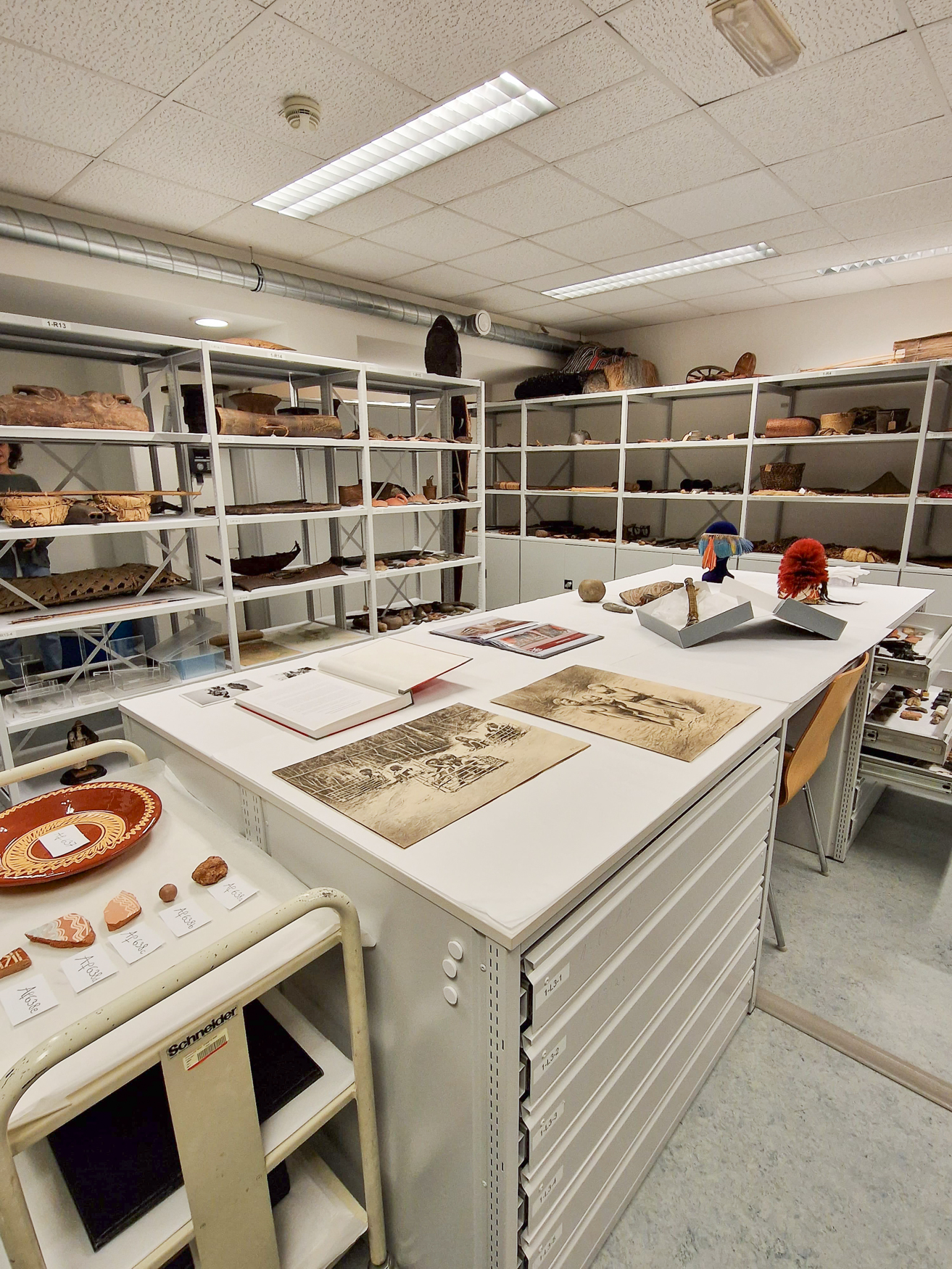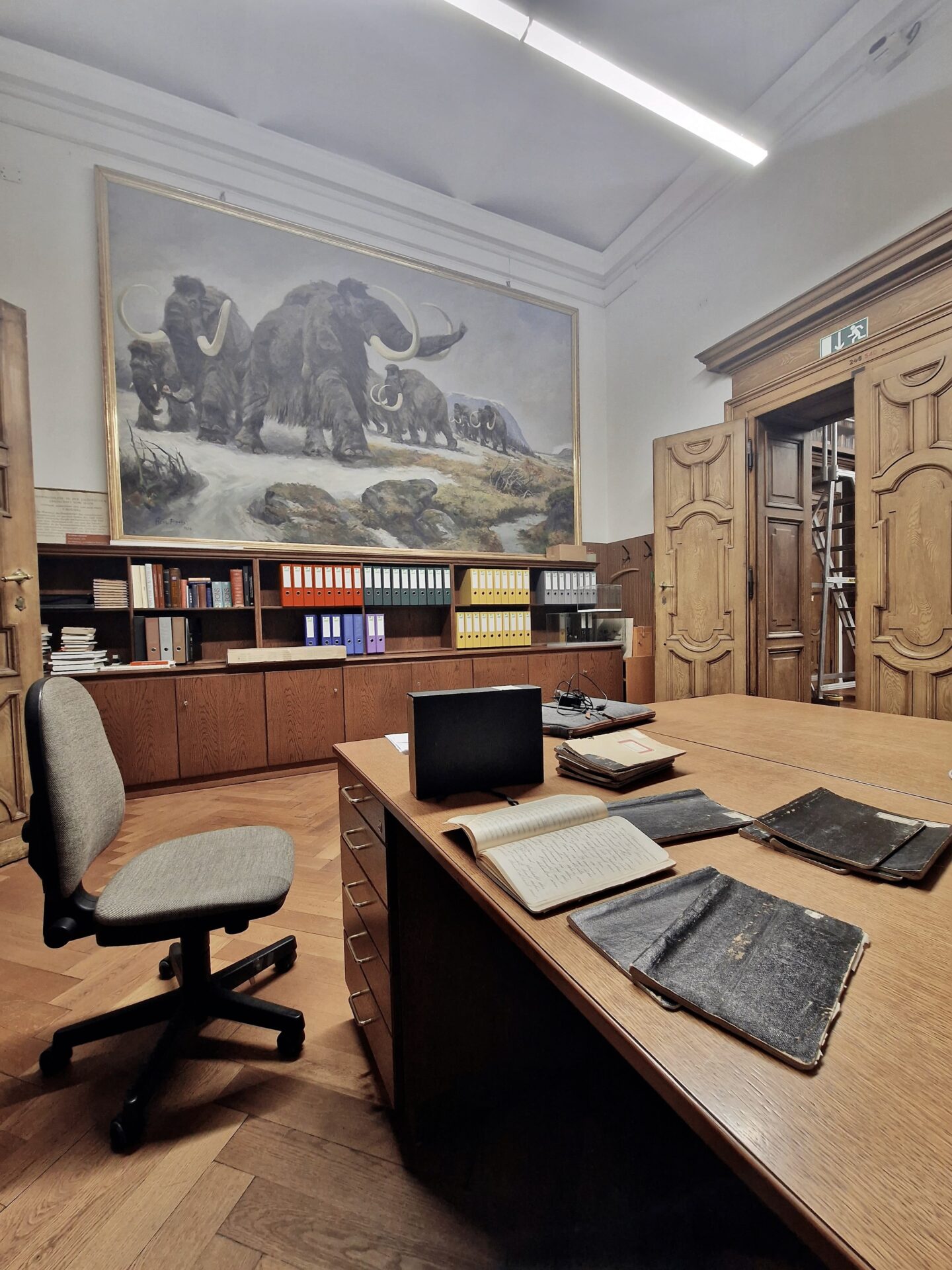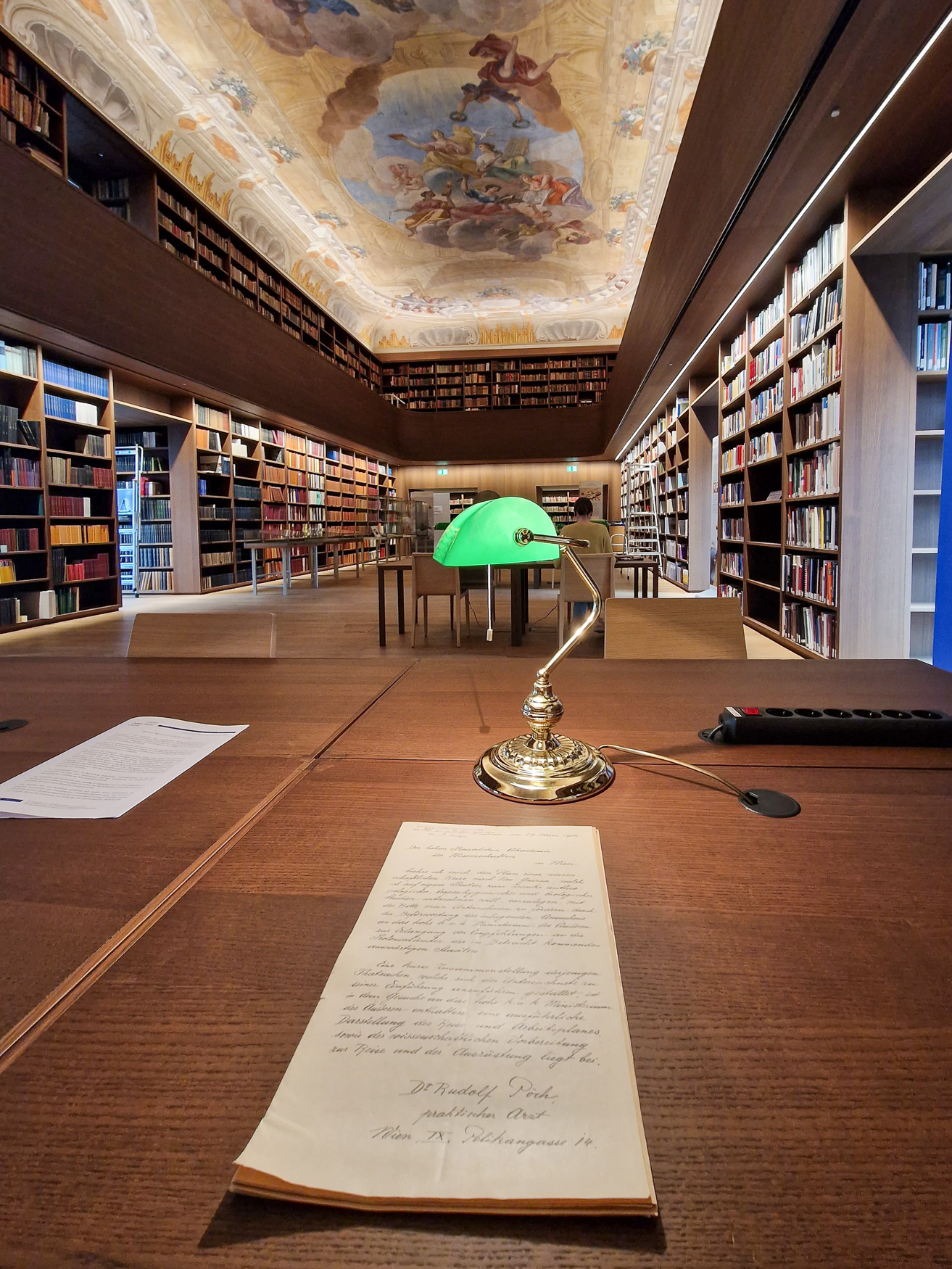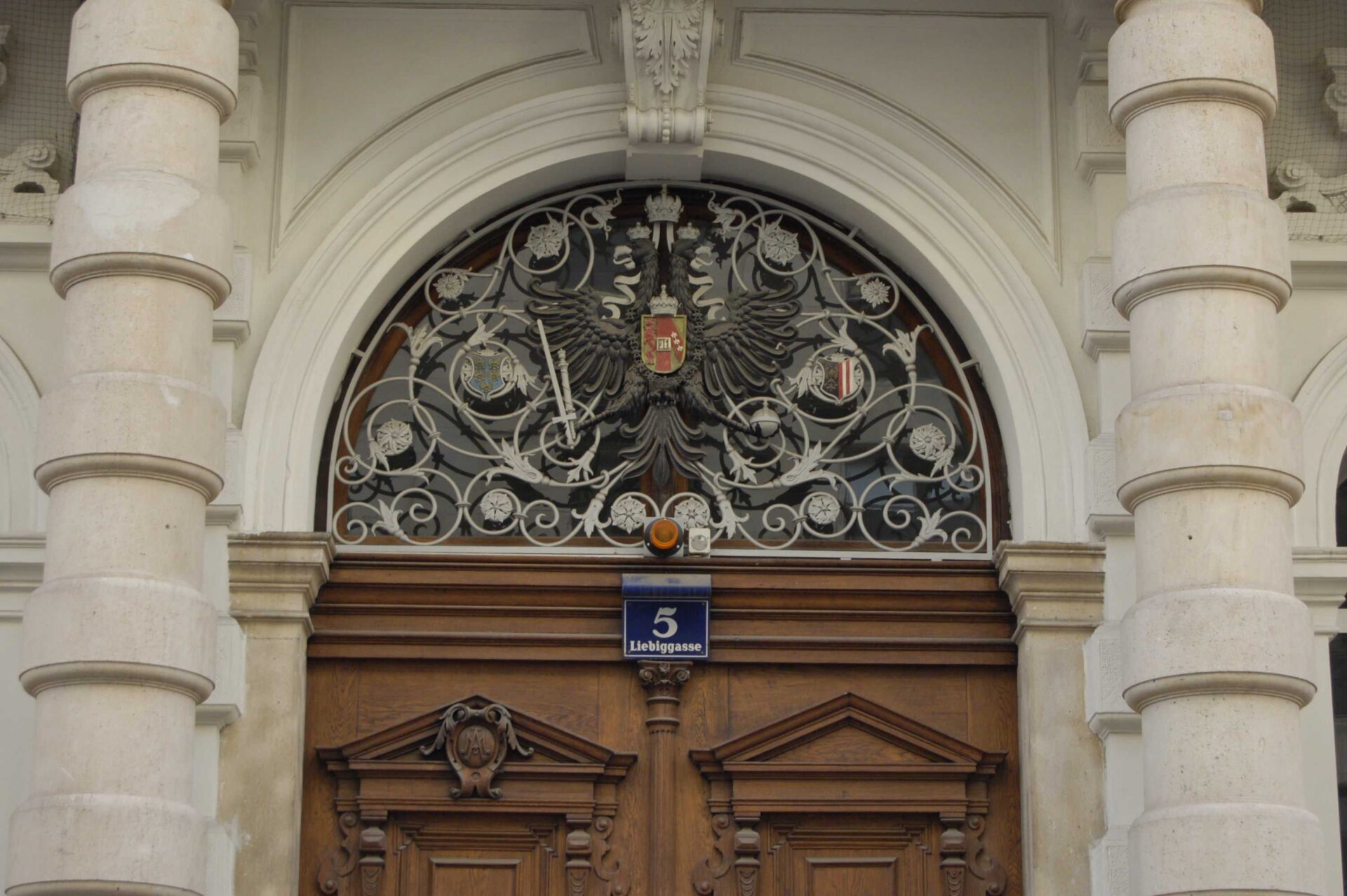Findability, Accessibility and Potential Engagement
The annotated list of institutions and sources on the expedition to Papua New Guinea (1904-06) is the result of literature research, as well as visits to the majority of relevant archives, collections and depots listed. It also benefits from conversations and email correspondence with the responsible curators and with international researchers who have dealt with Rudolf Pöch. Its aim is to make the sources easier to locate, and provides information on how to access them, in order to facilitate future research.
In his last will and testament, Pöch himself instructed that his enormous estate of ethnographic objects, documents, photographs, sound and film recordings, etc. be divided up and processed among several institutions. Most of them are located in Vienna.
A central aim of the research project, “The entangled colonial history of sound recordings” was to provide a descriptive list of the various holdings distributed among Austrian institutions that are closely related to Pöch’s journey to Papua New Guinea. The focus is on sources that allow the reconstruction of the fragmented entangled colonial history of institutions, actors and infrastructures.
Some notes on the list
The list is organized by institution, and includes contact information for the responsible persons who can provide more detailed information, advice and support. Information on access to sources and existing research tools is also provided.
Due to legal, ethical and organizational considerations, we have decided to limit ourselves to brief descriptions of the respective holdings – i.e. the so-called metadata on the original sources. Our aim was to explain transparently – in two languages for now (German and English) – what kind of sources with which content can be found where.
The following descriptions contain direct quotations from the historical sources, which are marked with double quotation marks (“ ”). Single quotation marks (‘ ’) denote terms that need to be critically scrutinized with regard to their semantics (e.g. ‘collecting’, ‘human remains’) or that are established in specialized discourses yet not in common use (e.g. ‘things of knowledge’).
For the sake of completeness, we would like to point out that, in some cases, there are overlaps – further ‘entanglements’ – between the holdings of the individual institutions, for example in regards to the photographs. Elsewhere, additional documents and objects relating to Rudolf Pöch’s life and other ‘research activities’ can be found in the same archives and museums: For example, from his journey to what is now Namibia and Botswana (1907-1909), with financial support from the Imperial Academy of Sciences, and from his ‘research activities’ in the prisoner-of-war camps in Eger (now Cheb in the Czech Republic) and Reichenberg (now Liberec in the Czech Republic) during the First World War (1915).
In the course of the project and when compiling this list, gaps and as-yet unannotated material were also documented. One example of this is the lack of sources on an important contact of Pöch in Papua New Guinea, namely the missionary Franz Vormann, who belonged to the Catholic order “Society of the Divine Word”. Also, some institutional holdings have not yet been recorded and inventoried.
Institutions with Sources on
the ‘Expedition’ to Papua New Guinea
Austrian Academy of Sciences
Phonogrammarchiv
The Phonogrammarchiv of the Austrian Academy of Sciences contains 94 sound recordings made by Pöch, with respective paper documentation recorded onto wax discs with a phonograph and documented in writing in today‘s Papua New Guinea. The negatives of the discs exist as nickel-plated copper matrices, from which positives were made on epoxy resin discs in the 1960s. The original wax disc copies were destroyed during a bombing raid at the end of the Second World War. All surviving sound recordings were contextualised and published in 2000 as part of the CD edition series The Complete Historical Collections (1899-1950). The protocols, filled in by hand, are attached to the CD-ROM as digital copies. They provide information on the respective recording locations and contain key data on the persons recorded. There are also several prints of a photograph in various formats that Pöch took on November 12, 1905 in Cape Nelson (Papua New Guinea). The photograph has been reproduced and published many times. It shows a group of people making a recording with the Archive Phonograph.
Sources
- Schüller, Dietrich, ed. 2000. Papua New Guinea (1904–1909). The collections of Rudolf Pöch, Wilhelm Schmidt, and Josef Winthuis (Sound Documents from the Phonogrammarchiv of the Austrian Academy of Sciences. The Complete Historical Collections 1899–1950. Series 3), Vienna: Verlag der Österreichischen Akademie der Wissenschaften. (Commentary by Don Niles)
Address: Phonogrammarchiv, Austrian Academy of Sciences, Liebiggasse 5, 1010 Vienna, Austria
Contact: Christian Liebl, curator of the Historical Collection (1899–1950) (since 2020)
E-mail: pha-holdings@oeaw.ac.at
Access and use: Request for sound recordings from the Phonogrammarchiv by e-mail and access according to usage agreement
Research information: Catalogue: https://catalog.phonogrammarchiv.at/search/739 (GER)
BAS:IS (Library, Archive and Collections: Information & Services)
In the category “Allgemeine Akten” [general files] (file no. 345/1904), there are documents relating to a request for support from Pöch dated March 29, 1904. Here there is information on a travel plan submitted by him, which was then sent to the k.u.k. [imperial and royal] General Consulate in Berlin and sent from there to the General Consulate in London. These archived sources contain various declarations of support for Pöch from imperial and colonial powers (e.g. Dutch ministry, German and English colonial offices). There is also a letter of thanks to Pöch for photographs from Papua New Guinea (no. 997/1906).
The category “Subventionen” [subsidies] contains, for instance, information about an approved trip by Pöch to The Hague. There is also an application from Emilie Bondy-Horowitz, one of Pöch’s students, for a grant of 300 schillings. This grant was for the processing of human remains (at the time coldly categorized as “anthropologisches Material” [anthropological material]) that Pöch had taken with him from Papua New Guinea and the so-called Bismarck Archipelago (No. 504/1926).
The category “Pöch-Kommission” [Pöch commission] includes Pöch’s will (1921) and several versions of draft statutes as well as an obituary by Richard Thurnwald. Rudolf Pöch and Richard Thurnwald had an exchange in Silvaplana, Switzerland, in 1906 about Thurnwald’s planned trip to Papua New Guinea, in which Pöch gave medical advice and provided information about customs duties and mission infrastructures. Thurnwald was later to bring his own colonial “collection” to Europe, which is now housed in the Humboldt Forum in Berlin. The document category also includes the article “Rudolf Pöch” by Andrew Arthur Abbie (published in 1962 in Oceania, Vol. 33, pp. 128-130). Further and more detailed information on the collection can be found in the corresponding archive supplement.
Sources
- Conversation with Stefan Sienell and archive visit on March 05, 2024
- E-mail correspondence with Stefan Sienell on February 21, 2024 and May 24, 2024
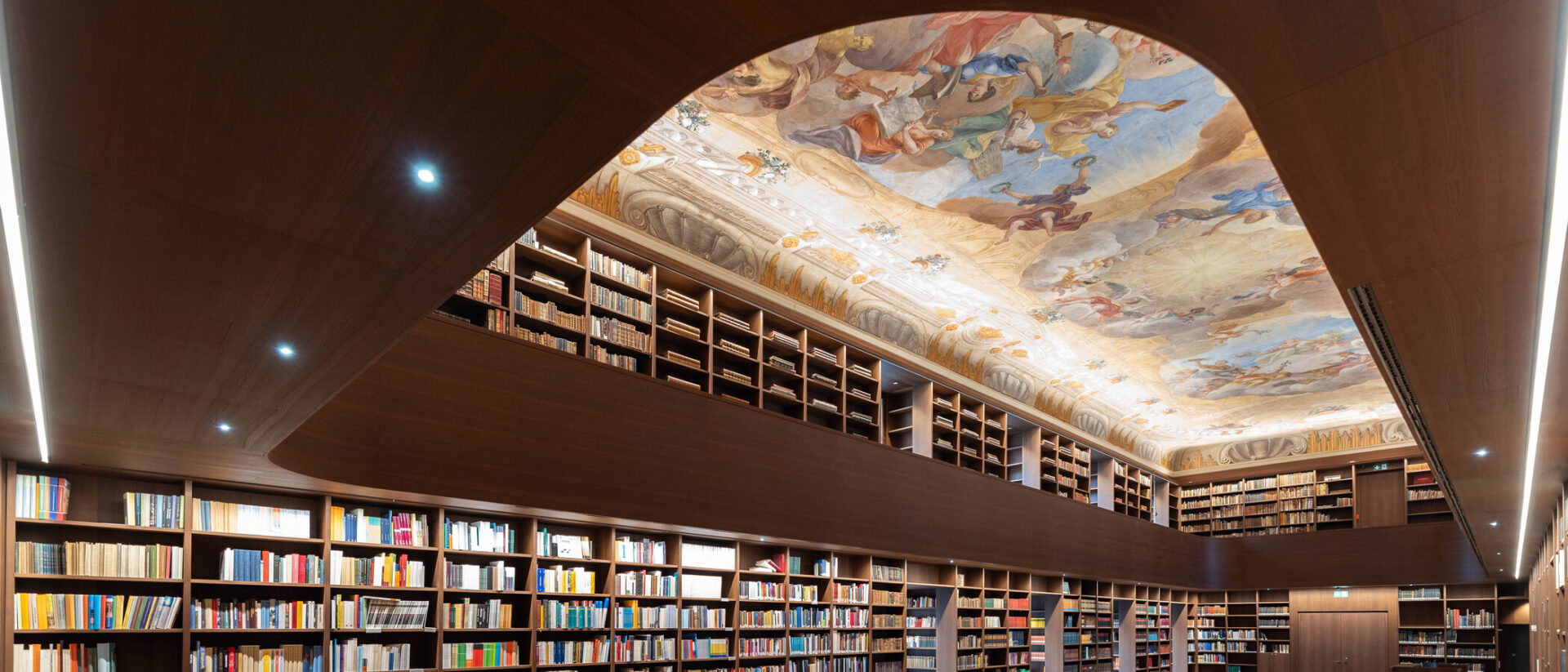
Address: BAS:IS, Austrian Academy of Sciences, Bäckerstraße 13 / Stiege B, 1010 Vienna, Austria
Contact: Dr Stefan Sienell, archive management (since 2000)
E-mail: archiv@oeaw.ac.at
Access and use: Request by e-mail and access according to usage agreement
Research information: There are archive aids for the categories “Pöch-Kommission” [Pöch commission] (created by Stefan Sienell) and “Subventionen” [subsidies]. Sienell created a short introductory text with a selection of further reading for the archive aid with an overview of the documents of the Pöch Commission. The archive supplement “Subventionen” [subsidies] contains a detailed introduction to the Academy’s subsidy system before 1914 and was compiled in 2005 and 2006 by Daniela Svabik, Marianne Wenger, Hannah Winkelbauer and Stefan Sienell.
University of Vienna
Vienna University Archive
The Vienna University Archive mainly contains administrative files on Pöch (Senate S 90.21; PH S 34.7; Senate S 304.974). There is also a personnel file about him (PH PA 2811), which contains documents relating to his state doctorate and further career at the university. There are also documents relating to some of his public lectures, which, however, have no reference to Papua New Guinea (including one in Prague and one with regard to the Vienna Anthropological Society). There are also meeting reports that provide information on the consultations regarding the reappointment of the Chair of Anthropology and Ethnography after Pöch’s death, and applications regarding the Rudolf Pöch memorial in the arcaded courtyard of the main building of the University of Vienna.
All these documents were created after Pöch’s trip to Papua New Guinea and are evidence of his scientific career, which he based on his “collections”. Relevant to the question of a history of colonial entanglements were, for example, the assessments of the university commissions regarding the “scientific value of the collections” – i.e. ethnological objects as epistemically valuable ‘things of knowledge’. Finally, some of Pöch’s University lectures are documented – including one on Papua New Guinea. Audience numbers are also noted in these documents.
The professorial file contains – in some cases in several versions – information on Pöch’s biography, commission applications and reports on his nomination as Associate Professor of Anthropology and Ethnography, his admission as a private lecturer, a list of lectures held with information on “teaching exercises” and “property” of Pöch, as well as a curriculum vitae written by Pöch himself.
Source
- Archive visit on February 15, 2024
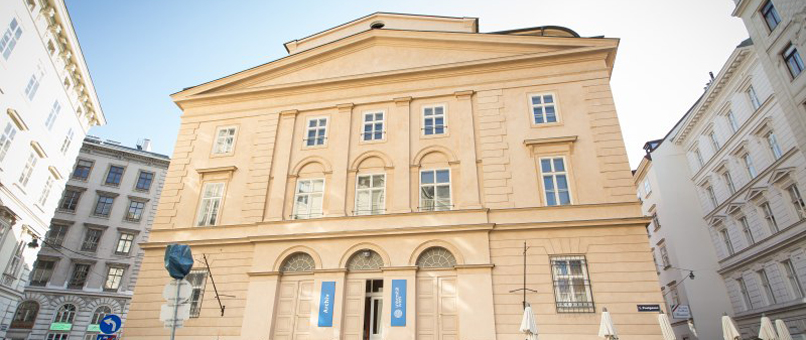
Address: Vienna University Archive, University of Vienna, Postgasse 9, 1010 Vienna, Austria
Contact: E-mail: archiv@univie.ac.at
Access and use: Appointments may be requested by e-mail. A user sheet must be completed on site for each research topic and calendar year.
Research information: The holdings can be researched via the link https://bibliothek.univie.ac.at/archiv/en/archivrecherche.html, which leads to the archive information system of the Vienna University Archive on the one hand and to digitized finding aids on the other. The former can be used in German, English, Italian and French.
Collections of the Department of Evolutionary Anthropology
The Department of Evolutionary Anthropology at the University of Vienna holds around 1500 photographic glass negatives, around 500 teaching slides, a few photographic prints, a racist bust and human remains relating to Rudolf Pöch’s colonial expedition to Papua New Guinea and Australia (1904-1906).
Several small-format original photographic prints of Rudolf Pöch’s colonial Oceania expedition are archived at the department. There are also later photographic enlargements of these. The captions are mostly negative numbers, anthropological numbers, descriptions and, more rarely, names of the people photographed and titles of the perceived ethnic groups. These textual descriptions and classifications direct and shape the viewer’s gaze: for example, binary categories such as “alter Mann” [old man] or “Frauen” [women] and descriptions such as “Vorbereitung Schweine essen” [preparing to eat pigs] or “Häuser” [houses] have been written on these objects.
There is a store cabinet with teaching slides containing a selection of Pöch’s photographs as diapositives. In conversation, Katarina Matiasek described the classification of these teaching slides in the corresponding store as a “Zerstückelung” [fragmentation] of the body, as some of those depicted were divided into the categories “Kopf und Körper” [head and body]. Other categories are, for example, “Landschaften/Siedlungen/Flora” [landscapes/settlements/flora]. Some slides are labelled. There are portraits, “Typenaufnahmen” [type shots], documentation of colonial life, objects, group shots and self-portraits.
In the course of the division of Rudolf Pöch’s estate, the human remains from Papua New Guinea, then coldly referred to as “anthropologisches Material” [anthropological material], were handed over to the anthropologist Emilie Bondy-Horowitz (1897-1960). She published the monograph Beiträge zur Anthropologie von Nordost-Neu-Guinea [Contributions to the Anthropology of Northeast New Guinea] (1930) with the support of the (Austrian) Academy of Sciences. In the course of this, she identified and organized the previously disordered photographs of this colonial expedition on the basis of original diary entries and later instructional slide captions. In her work, Bondy-Horowitz drew on measurement sheets filled out by Pöch in Papua New Guinea with anthropometric data, which are no longer preserved today. This method of physical anthropology was used to justify racist ideas of “Typen” [types] and “Rassen” [races].
All human remains in the Collections of the Department of Evolutionary Anthropology that originate from colonial acquisition contexts have been restricted since 2016. Even those human remains that were shipped by Pöch from Papua New Guinea to Vienna are exclusively subject to provenance research. Curator Katarina Matiasek is currently (2024) working on the repatriation of human remains to their societies of origin and on the recirculation of photographs from colonial contexts. In 2011 and 2023, human remains that Pöch had appropriated with the help of colonial infrastructures were restituted to Australia (cf. German article: https://science.apa.at/power-search/16410975123713161669).
The archive holdings of the Department of Evolutionary Anthropology have already been the subject of several scientific publications. In her article “Anthropologische Sammlung” [Anthropological Collection] (2012), Teschler-Nicola (2012) describes the archive of the Department of Evolutionary Anthropology in connection with Pöch. Katarina Matiasek and Harald Wilfing (2021) examine the colonial collection history of the department and how it is handled today in a book chapter.
Sources
- Conversation with Katarina Matiasek and Harald Wilfing on January 18, 2024
- Collection visit to the Department of Evolutionary Anthropology at the University of Vienna on January 30, 2024
- E-mail correspondence with Katarina Matiasek on May 20, 2024
- Teschler-Nicola, Maria. 2012. „Anthropologische Sammlung“. In Schaukästen der Wissenschaft, edited by Claudia Feigl. Vienna: Böhlau, 29–32.
- Matiasek, Katarina, and Harald Wilfing. 2021. “Evolutionary Anthropology, Colonial Histories and a Collection Reframed”. In: Das Museum im kolonialen Kontext, ed. By Pia Schölnberger. Vienna: Czernin, 81–98.

Address: Collections of the Department of Evolutionary Anthropology, University of Vienna, University Biology Building (UBB), Djerassiplatz 1, 1030 Vienna, Austria
Contact: Katarina Matiasek, curator (since 2022),
E-mail: katarina.matiasek@univie.ac.at
Access and use: Request by e-mail and access according to usage agreement
Collection of Musical Instruments of the Institute of Musicology
The Collection of Musical Instruments of the Institute of Musicology contains a pair of sacred flutes (murup) and two drums (kundu) from Papua New Guinea, which were given to the Institute on permanent loan from the Phonogrammarchiv of the Austrian Academy of Sciences. Apart from the loan agreement with the Phonogrammarchiv, no documentation is available for these instruments.
Source
- E-mail correspondence with Martin Ringsmut on February 01, 2024 and May 22, 2024
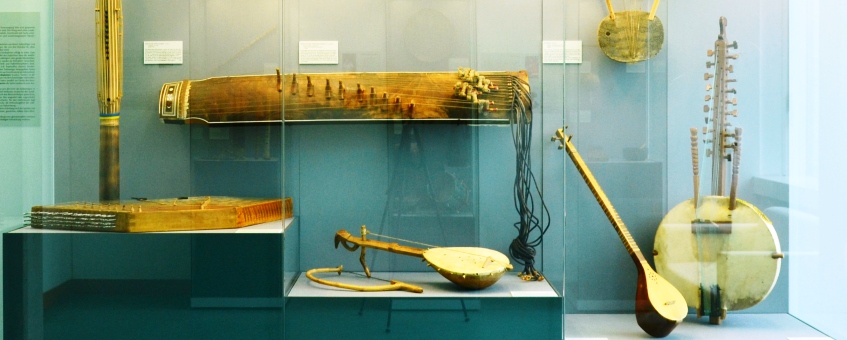
Address: Collection of Musical Instruments of the Institute of Musicology, University of Vienna, Spitalgasse 2, Courtyard 9 (Campus), 1090 Vienna, Austria
Contact: Dr Julio Mendívil and Dr Martin Ringsmut, heads of the Collection of Musical Instruments (since 2023),
E-mail: martin.ringsmut@univie.ac.at
Access and use: Request by e-mail
Research information: Musical Instruments Database: https://muwidb.univie.ac.at/instrumentenDB/editor/index.php (GER)
Ethnographic Collection of the Department of Social and Cultural Anthropology
The Ethnographic Collection of the Department of Social and Cultural Anthropology at the University of Vienna holds 31 objects from Pöch’s journey to Papua New Guinea (Oceania Collection). They are fully documented. Among other things, the objects include stone axes, grinding stones and a “magic stone” with a net made of bast, some coconut shells, a bag, “Paradiesvogelschmuck” [bird of paradise jewellery] a cassowary bone, a sperm whale tooth, a belt made of nassa snails, a spear sling as well as a basket. The objects are recorded in the UNIDAM database with photos, to which a scale is attached as a size reference.
There are also written archival holdings in the archive of the Ethnographic Collection and presumably photographs in the photo collection that are related to Pöch’s journey, but which are currently in the process of being viewed and inventoried.
Sources
- Conversation with study assistant Victoria Immervoll during a guided tour of the Ethnographic Collection of the Department of Social and Cultural Anthropology on November 09, 2023
- Conversation with study assistant Matthias Ziegner at the Institute of Social and Cultural Anthropology on July 30, 2024
- Visit to the depot of the collection on November 09, 2023
- Visit to the collection on November 20, 2023
- E-mail correspondence with Matthias Ziegner on November 08, 2024
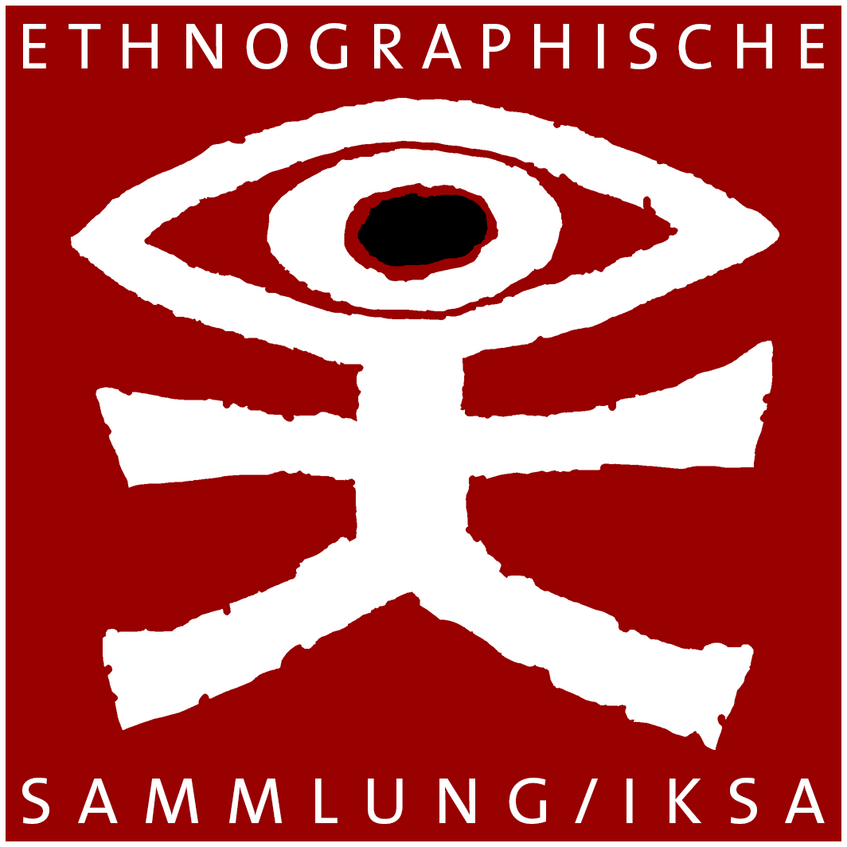
Address: Ethnographic Collection of the Department of Social and Cultural Anthropology, University of Vienna, NIG, 4th floor, Universitätsstraße 7, 1010 Vienna, Austria
Contact: Dr Igor Eberhard, head of the collection
E-mail: sammlung.ksa@univie.ac.at
Access and use: Access to the objects for research purposes and research work is possible on request by e-mail. There are regular guided tours of the depot (dates are announced on the website and can be arranged by e-mail).
Research information: A research guide in German and English, access to the UNIDAM database and an “Bestandsübersicht Objektsammlung” [Inventory overview of the object collection] in the form of an Excel list (as at 2023) are available on request by e-mail. The “Gesamtverzeichnis des Archivs am Institut für Kultur- und Sozialanthropologie” [Complete index of the archive at the Institute of Cultural and Social Anthropology] is currently being edited.
PHAIDRA contains index cards and inboxes of the object collection, as well as parts of the photographic collection and the written archive (https://phaidra.univie.ac.at/).
Natural History Museum Vienna
Department of Anthropology
The Anthropological Department of the Natural History Museum contains the so-called “Kleinen Hefte” [small notebooks] written by Pöch. They are a mixture of notes, diary entries, lists, etc. (16 pieces, approx. 703 pages), as well as correspondence books (No. 5 to No. 12, a total of 1161 pages) and several hundred prints of photographs from Pöch’s expedition to Papua New Guinea (1904–1906).
The “Kleine Hefte” [small notebooks] contain notes on photographic practices and lists of photo negatives and ethnological objects, as well as killed and taxidermied animals and human remains. All of this was brought abroad to Vienna by Pöch via colonial infrastructures. The documents also provide information about colonial networks (ships, Christian missions, actors), about various illnesses suffered by Pöch (for example his records of fever measurements) and about his travel routes. They also contain self-made drawings and cartographic sketches, as well as scattered information on phonographic recordings, word lists and notes on phonographically recorded songs.
The information in the “Kleine Hefte” [small notebooks] could be linked to other reports on so-called punitive expeditions in Papua New Guinea in order to gain a more precise understanding of the colonial contexts of violence. Pöch himself demonstrably took part in at least one of these punitive expeditions (cf. Künkler 2022: pp. 94-97, 136).
Sources
- Conversation with Margit Berner on November 27, 2023
- Archive visit to the Anthropological Department of the Natural History Museum on November 30, 2023
- E-mail correspondence with Margit Berner on May 21, 2024
- Künkler, Eva. 2022. “Koloniale Gewalt in Deutsch-Neuguinea und der Raub kultureller Objekte und menschlicher Überreste. Eine systematische Übersicht zu Militärgewalt und sogenannten Strafexpeditionen in deutschen Kolonialgebieten in Ozeanien (1884–1914)“ (Working Paper Deutsches Zentrum Kulturgutverluste 4). Magdeburg: Deutsches Zentrum Kulturgutverluste. https://doi.org/10.25360/01-2022-00056
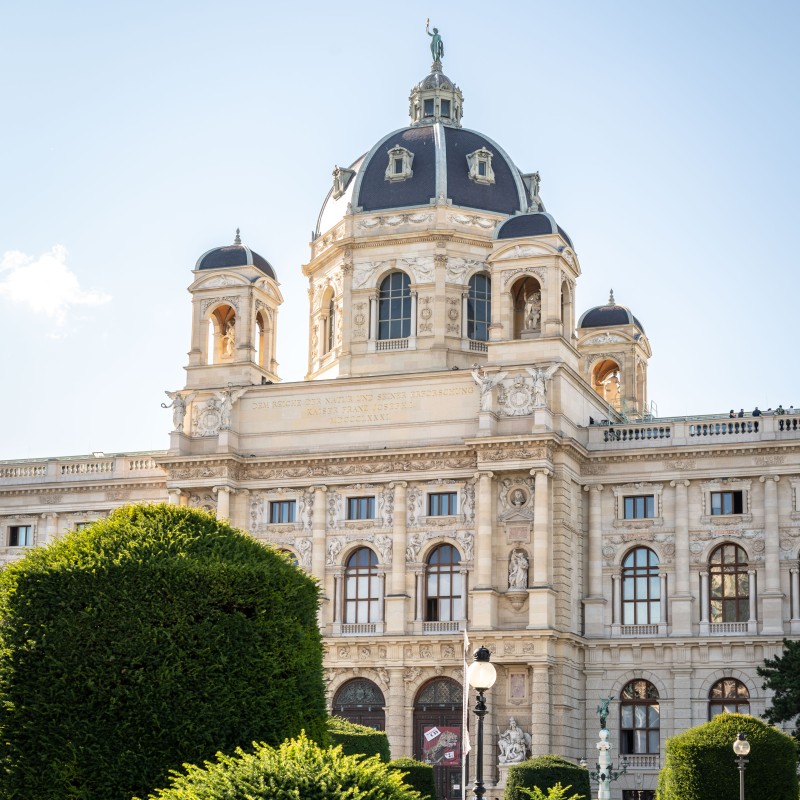
Address: Department of Anthropology, Natural History Museum Vienna, Burgring 7, 1010 Vienna, Austria
Contact: Dr Margit Berner, curator of the Abguß-Sammlung [cast collection], the Somatologische Sammlung [somatology collection] and the Fotothek [photo library],
E-mail: margit.berner@nhm-wien.ac.at
Access and use: Request by e-mail and access according to user contract
Department Archive for the History of Science
The Department Archive for the history of Science is a department at the Natural History Museum Vienna (NHM). The following sources are available in connection with Pöch’s journey to Papua New Guinea: Intendanzakten und Allgemeine Akten (Eisenkiste) [Intendant files and general files (iron box)].
There are several letters from Rudolf Pöch and his former student, then wife and assistant, Hella Pöch, dated from 1919 onwards. The Intendant files of the Natural History Museum (INT/KOLL/ADM files 1919–1920) contain further letters from Rudolf Pöch (520.07, 520.12, 514.06). These documents show that Pöch requested permission to give guided tours with his students in the “Indonesien-Saal” [Indonesia Hall].
Sources
- E-mail correspondence with Andrea Zaremba on May 21, 2024
- Visit to the archive on November 20, 2023
- Naturhistorisches Museum Wien. n.d. “Department Archive for the history of Science“, accessed April 30, 2024. https://www.nhm-wien.ac.at/forschung/archiv_fuer_wissenschaftsgeschichte
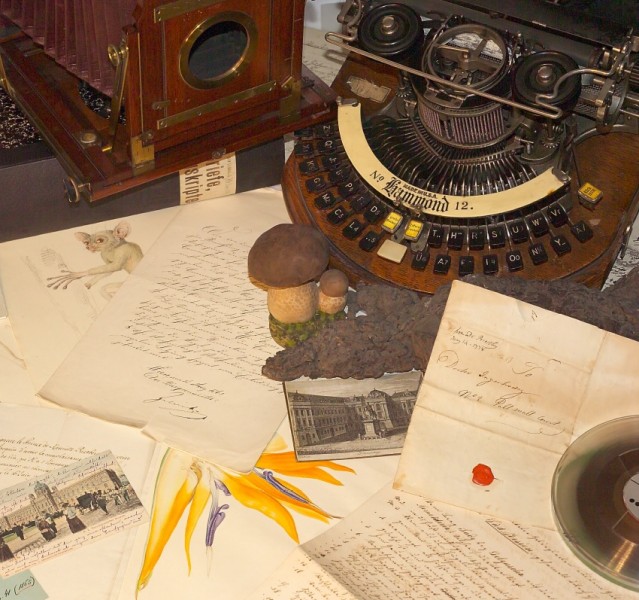
Address: Department Archive for the History of Science, Natural History Museum Vienna, Burgring 7, 1010 Vienna, Austria
Contact: Andrea Zaremba, archivist (since 2022),
E-mail: andrea.zaremba@nhm-wien.ac.at
E-mail: archiv@nhm-wien.ac.at
Access and use: The Department Archive for the history of Science is open to qualified interested parties for scientific use after prior registration by e-mail and in compliance with the user regulations. It is obligatory to fill out a user application including a legally binding declaration.
Weltmuseum Wien
Collection Oceania and Australia
The Collection Oceania and Australia of the Weltmuseum Wien contains around 3.800 objects from Papua New Guinea, most of which were brought to Vienna during Pöch’s colonial expedition. Most of the ethnographica have been photographed for internal purposes.
There is currently no further information on Pöch’s colonial acquisition practices in the context of this collection. Anton Dreher junior, an Austrian brewery industrialist, financed the purchase of all the ethnographica from Pöch’s colonial expedition, which are now archived in the Weltmuseum’s depot. These objects were donated to the museum by Dreher.
The location details and local descriptions of the inventoried objects were provided by Pöch: “Die Inventarisierung dieser zum allergrößten Teil von Dr. Rudolf Pöch 1904–1906 persönlich an Ort und Stelle aufgesammelten Kollektion lag ein eigenhändiges Acquisitionsjournal des Sammlers zu Grunde, dem alle geographischen, linguistischen und ethnologischen Angaben des folgenden Inventars entnommen sind. Die Schreibung der Orts- und Stammesnamen nach Dr. Rudolf Pöch“ [The inventory of this collection, which was for the most part personally collected on site by Dr Rudolf Pöch in 1904-1906, was based on an acquisition journal written by the collector himself, from which all geographical, linguistic and ethnological details of the following inventory were taken. The spelling of the place names and tribal names according to Dr Rudolf Pöch] (handwritten inventory of the collection, presumably by Michael Haberland, at the time k.u.k. [imperial and royal] custodian).
Sources
- Depot visit on December 04, 2023
- E-mail correspondence with Reinhard Blumauer on November 21, 2023 and May 15, 2024
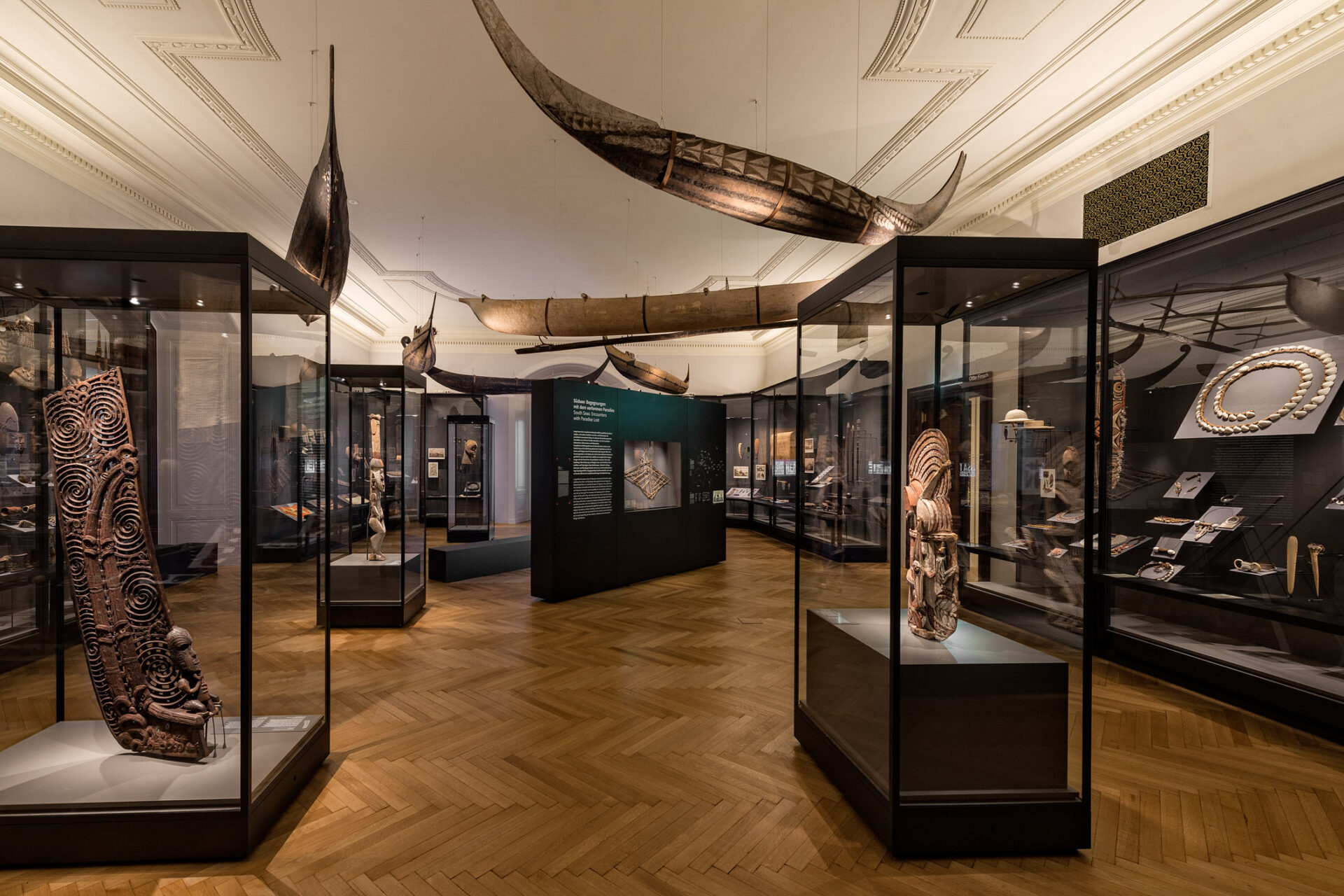
Address: Collection Oceania and Australia, Weltmuseum Wien, Neue Hofburg, Heldenplatz, 1010 Vienna, Austria
Contact: Reinhard Blumauer, interim curator of the Collection Oceania and Australia and the Collection Insular Southeast Asia (since 2022),
E-mail: reinhard.blumauer@weltmuseumwien.at
Access and use: Request by e-mail
Research information: The Archives [Schriftarchiv] of the Weltmuseum contain the inventory book with object descriptions created by Pöch and museum staff. The inventory was presumably carried out by Michael Haberland and completed on May 3, 1908.
The objects currently on display in the museum (as of 2024) can be found online on the museum’s website (https://www.weltmuseumwien.at/en/onlinecollection/).
Collection Analog and Digital Media: Film, Audio, Photography
The Collection Analog and Digital Media of the Weltmuseum contains a collection of glass slides, glass negatives and photographic prints (approx. 130 items) from Pöch’s colonial expedition to Papua New Guinea. This collection includes so-called “type photographs”, object photographs, photographs of villages and a few self-portraits.
For the development of the photographs from Papua New Guinea, a co-operation was established with the Moll company in Vienna, among others. Agfa plates in 9×12 format were sent to Vienna for development in tin boxes via colonial networks. Some photographs were developed on site. Further information on the intertwining of photographic practices with colonial infrastructures can be found in the so-called “Kleine Hefte” [small notebooks], as well as lists of photographic negatives with negative abbreviations. These documents can be found in the Anthropological Department of the Natural History Museum in Vienna (see entry on Natural History Museum on this page).
Sources
- Conversation with Hanin Hannouch on December 04, 2023
- Visit to the collection on January 10, 2024
- E-mail correspondence with Hanin Hannouch on November 21, 2023 and June 06, 2024
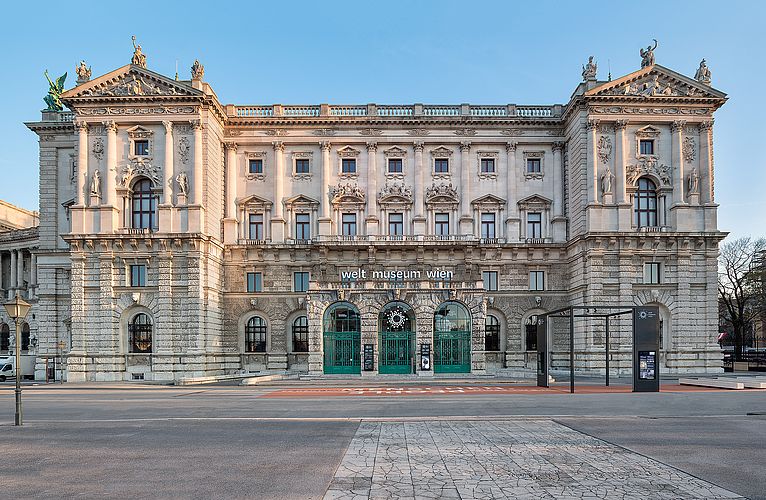
Address: Collection Analog and Digital Media: Film, Audio, Photography
Weltmuseum Wien, Neue Hofburg, Heldenplatz, 1010 Vienna, Austria
Contact: Dr Hanin Hannouch, curator of the Collection Analog and Digital Media: Film, Audio, Photography (since 2022),
E-mail: hanin.hannouch@weltmuseumwien.at
Access and use: Open to all requests. Make an appointment at least one month in advance with Hanin Hannouch by e-mail.
Research information: Some of the 200,000 object photos are available online (https://www.weltmuseumwien.at/en/onlinecollection/).
There is an internal database: TMS.
Archives
The few written documents relating to Pöch in the Archives of the Weltmuseum Wien are the post number inventories and the documents in his “Sammlermappe” [collector’s folder] as well as the inventory book. The “Sammlermappe” [collector’s folder] consists of individual pieces of correspondence, recording findings, directories and some copies of Pöch’s lectures and articles.
Source
- E-mail correspondence with Caroline McKinley on February 01, 2024 and May 17, 2024
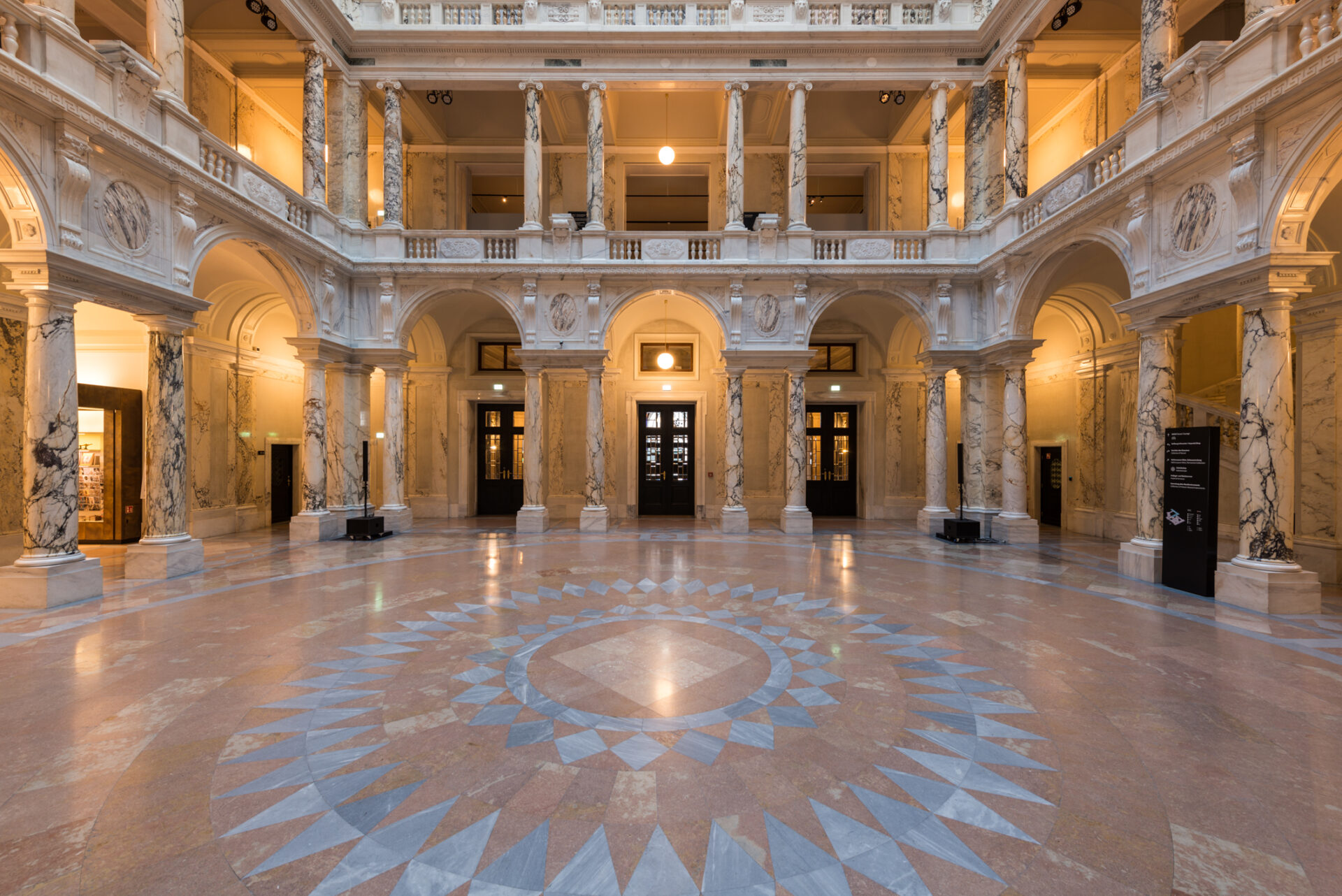
Address: Archives [Schriftarchiv], Weltmuseum Wien, Neue Hofburg, Heldenplatz, 1010 Vienna, Austria
Contact: Caroline McKinley, archivist (since 2024),
E-mail: Caroline.McKinley@weltmuseumwien.at,
Tel.: +43 1 534 30-5118
Access and use: The archive is open to both academic researchers and interested private individuals by appointment. Inquiries should be made in writing or by telephone to Caroline McKinley.
Austrian State Archives
Allgemeines Verwaltungs-, Finanz- und Hofkammerarchiv
The Allgemeines Verwaltungs-, Finanz- und Hofkammerarchiv [General Administration, Finance and Court Chamber Archives] of the Austrian State Archives contains Pöch’s professorial file with information on his biography, commission applications and reports on his appointment as associate professor of anthropology and ethnography, approvals as a private lecturer, a list of planned lectures with information on “Lehrübungen” [teaching exercises] and Pöch’s “Eigentum” [property] (e.g. skeletons, skulls, “soft parts”, photographs, slides, films from Papua New Guinea) and a curriculum vitae written by Pöch himself. His lectures are primarily devoted to physical anthropology, whereby he also taught “anthropologische Untersuchungsmethoden” [anthropological examination methods], for example: “Vergleichendes Beschreiben” [comparative description] or “Messen, Fotografieren und Zeichnen von Lebenden der Schädel und Skelette” [measuring, photographing and drawing skulls and skeletons of living people].
For further research in the holdings of the State Archives regarding Pöch’s journey and possible subsidies from the Ministry of Education it is possible to examine sources from the “Unterricht-Allgemein” [general teaching] collection, which contains year-by-year index volumes.
Sources
- Archive visit on January 17, 2024
- E-mail correspondence with Roman Hans Gröger on January 12, 2024
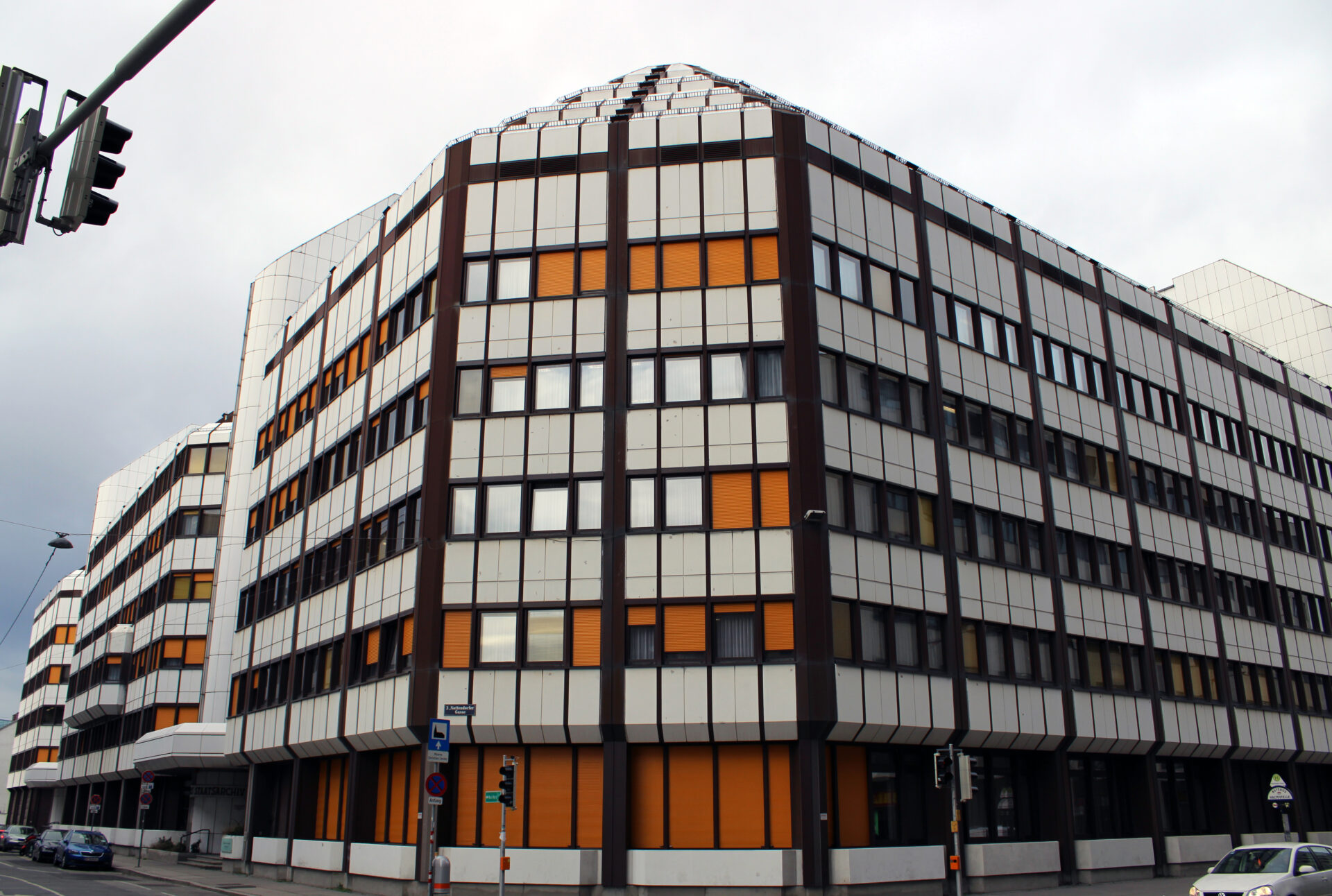
Address: Allgemeines Verwaltungs-, Finanz- und Hofkammerarchiv Hofkammerarchiv [General Administration, Finance and Court Chamber Archives], Austrian State Archives, Nottendorfer Gasse 2, 1030 Vienna, Austria
Contact: E-mail: avafhka@oesta.gv.at
Access and use: cf. https://www.oesta.gv.at/benutzung/Recherche-zu-Hause/recherche.html (GER) or https://www.statearchives.gv.at/user-information.html (ENG) for detailed information (incl. “Archivplan” [plan of the archive] on the German website) and forms for written inquiries. These can be sent via e-mail. Personal visits are possible during the opening hours of the archive according to the user regulations.
Research information: Archive Information System (AIS): https://www.archivinformationssystem.at/suchinfo.aspx, available in several languages (German, English, Italian, French, Dutch)
Filmarchiv Austria
Film Repository Laxenburg
The Filmarchiv Austria maintains Austria’s largest film collection at its Laxenburg location. The collection also includes original film reels with cinematographic recordings by Rudolf Pöch of his trips to Papua New Guinea. According to the archive, there is no further written documentation on the films. The number of films from Papua New Guinea and their contents are therefore unclear.
In addition to three photo cameras and a phonograph, Pöch also brought a cinematograph on his expedition to New Guinea. The cinematograph was probably taken at the suggestion of the British ethnologist A. C. Haddon (Cambridge), who had already made cinematographic recordings on one of the islands of the Torres Strait in 1898. For an overview of the filmed scenes, see the publication “Die Filmaufnahmen von Rudolf Pöch (Von den Anfängen der kinematographischen Dokumentation in der Anthropologie)” [The film recordings of Rudolf Pöch (From the beginnings of cinematographic documentation in anthropology] by Paul Spindler (1974). Spindler had access to (edited) film copies that were published in the former “Bundesstaatliche Hauptstelle für Lichtbild und Bildungsfilm” [Federal State Main Office for Photographs and Educational Film] in Vienna – founded in 1945 – and are now kept as part of the “Sammlung ÖWF” [Collection ÖWF] (ÖWF stands for Österreichisches Bundesinstitut für den Wissenschaftlichen Film [Austrian Federal Institute for Scientific Film]) in the Austrian Mediathek [Austrian Media Library] of the Technisches Museum Wien [Vienna Museum of Science and Technology] (cf. entry on the Mediathek on this page).
Between 2016 and 2023, some films were digitized in high resolution and viewed by Anette Hoffmann and Jannik Franzen in a current artistic research project (since 2024).
Sources
- E-mail correspondence with Christina Schnitzhofer and Susanne Rocca (Film Repository Laxenburg) on February 08, 2024
- Spindler, Paul. 1974. “Die Filmaufnahmen von Rudolf Pöch (Von den Anfängen der kinematographischen Dokumentation in der Anthropologie)“. In Annalen des Naturhistorischen Museums in Wien 78. Vienna: Verlag des Naturhistorischen Museums, 103–108
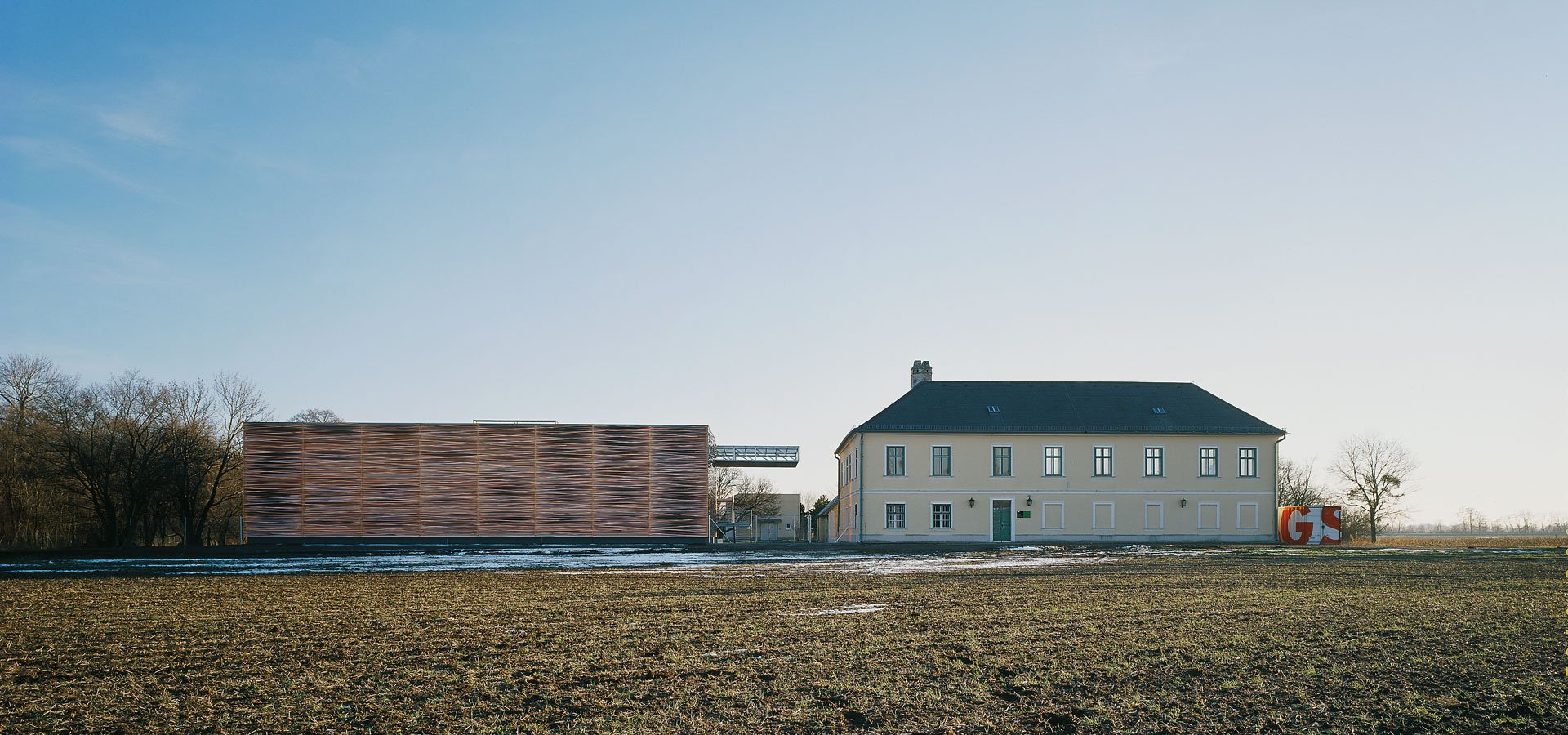
Address: Film Repository Laxenburg, Filmarchiv Austria, Parkweg 89, 2361 Laxenburg, Austria
Contact: E-mail: laxenburg@filmarchiv.at
Access and use: With regard to the use of these recordings, a distinction is made between viewings for scientific purposes and commercial use. Viewing files of digitised films can be made available with a logo and time code. If parts of the film or an entire film is to be used publicly (e.g. for exhibitions, cinema productions, internet and television publication), usage fees will be charged depending on the type of use.
Research information: Research in an internal database is carried out by archive staff on request.
Technisches Museum Wien
Österreichische Mediathek
Pöch also had a cinematograph with him on his expedition to New Guinea. The preserved original film reels are kept at the Laxenburg site of the Filmarchiv Austria (cf. entry on the Filmarchiv Austria on this website). Paul Spindler made edited copies of them for scientific purposes. They are part of the so-called “Sammlung ÖWF” [Collection ÖWF] (ÖWF stands for Österreichisches Bundesinstitut für den Wissenschaftlichen Film [Austrian Federal Institute for Scientific Film]) and can be researched on the website of the Österreichische Mediathek [Austrian Media Library] and are partly available online (see e.g. “Neuguinea [Ausschnitt]“ [New Guinea [excerpt]], https://www.mediathek.at/atom/135BBA4F-3BB-0008D-00000B84-135B28B9, GER).
Source
- Pöch, Rudolf and Paul Spindler. 1958. “Neu-Guinea (in Memoriam Prof. Dr. Rudolf Pöch)”. Bundesstaatliche Hauptstelle für Lichtbild und Bildungsfilm, Vienna.
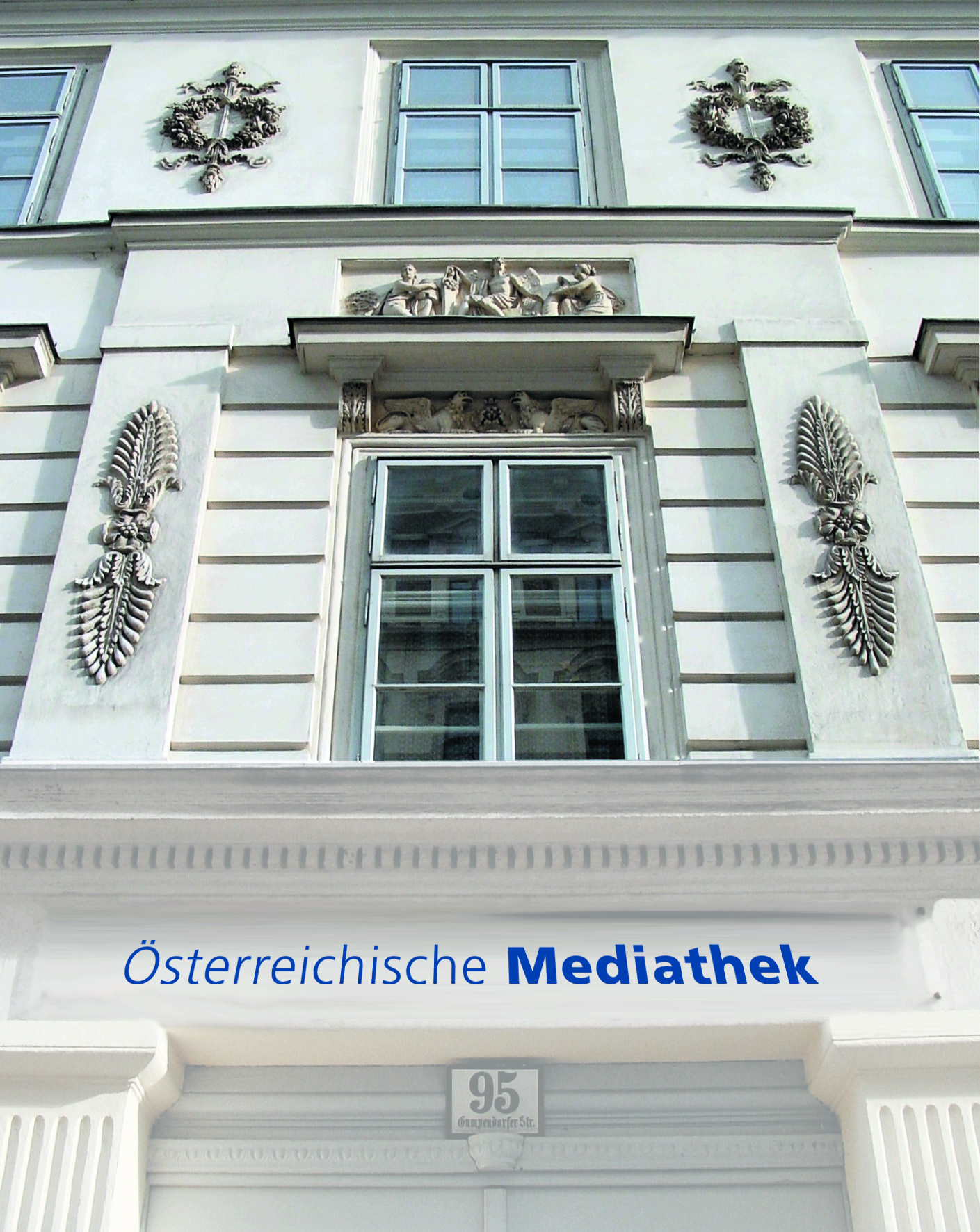
Address: Österreichische Mediathek [Austrian Media Library], Technisches Museum Wien [Vienna Museum of Science and Technology], Webgasse 2a, 1060 Vienna, Austria
Contact: E-mail: mediathek@mediathek.at
Tel.: +43 1 5973669-0
Research information, access and use: The entire holdings of the Österreichische Mediathek [Austrian Media Library] can be searched online on the website. If no digitised medium is available online for listening or viewing, the recording can be requested on a request basis, but can in any case be viewed in the media library.
Staatsbibliothek zu Berlin – Prussian Cultural Heritage
Department of Manuscripts and Early Printed Books
The Department of Manuscripts and Early Printed Books of the Staatsbibliothek zu Berlin [Berlin State Library] holds a partial estate of Felix von Luschan. It includes correspondence with his pupil Rudolf Pöch. Luschan’s estate comprises 66 boxes and includes correspondence, manuscripts, working materials, maps, notes, photographs, offprints, galley proofs and proof sheets (e.g. reviews), personal papers and newspaper excerpts.
The correspondence with Pöch (cf. Nachlass Felix von Luschan: Friedrich Becke (1855–1931), Mappe Rudolf Pöch [Felix von Luschan estate: Friedrich Becke (1855-1931), Rudolf Pöch folder]) provides insights into Pöch’s decision to pursue a medical career, which was linked to his desire to travel to Papua New Guinea. There is also information on the financing of the trip, as well as on important scientists who prepared Pöch for the trip, for example Rudolf Martin or Paul and Fritz Sarasin (for further information, see the description of relevant holdings in the Basel-Stadt State Archives below).
Source
- E-mail correspondence with Hilary Howes on January 12, 2024
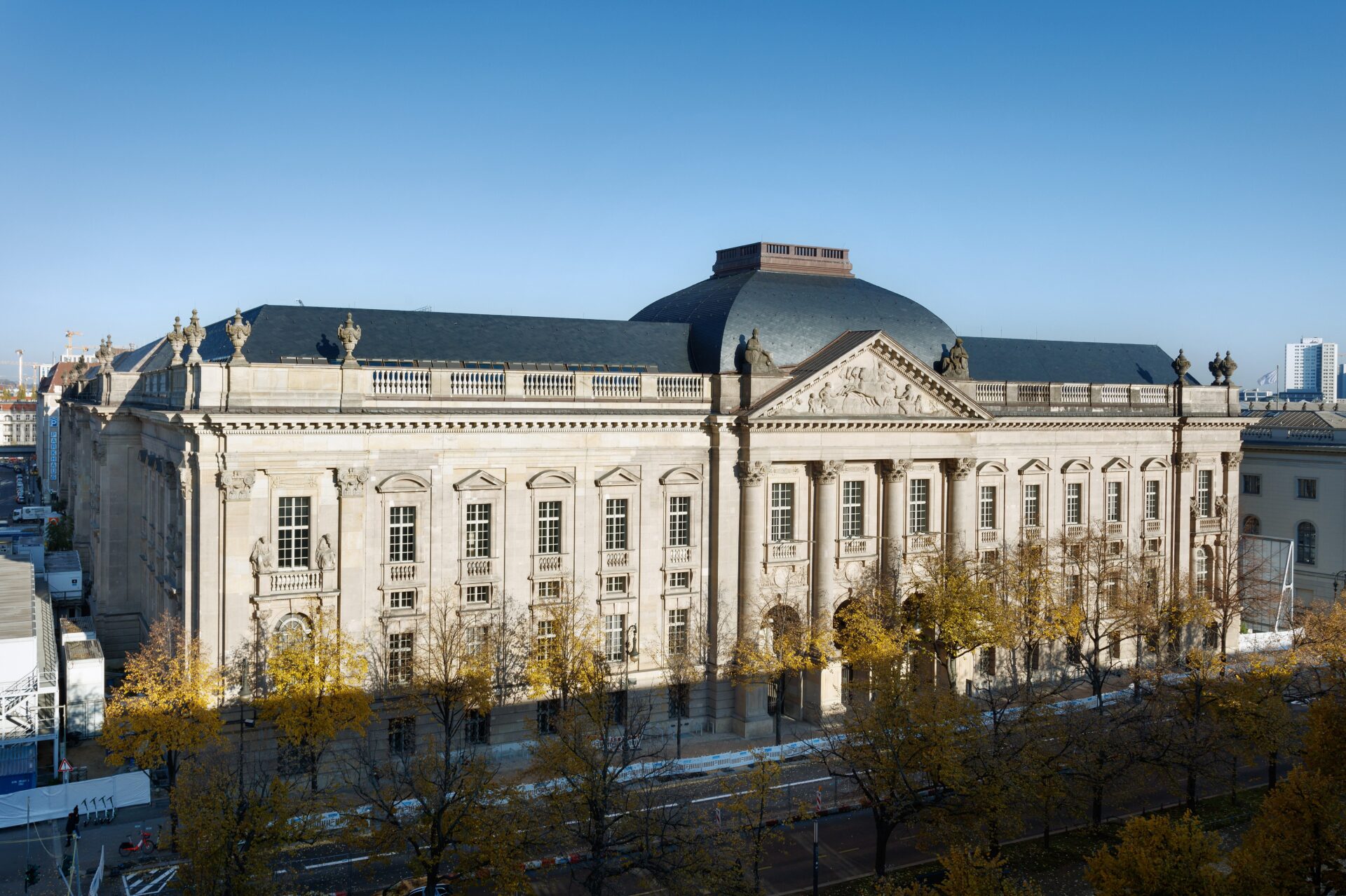
Address: Abteilung Handschriften und Historische Drucke [Department of Manuscripts and Early Printed Books], Staatsbibliothek zu Berlin – Preußischer Kulturbesitz [Berlin State Library – Prussian Cultural Heritage], Unter den Linden 8, 10117 Berlin, Germany
Contact: E-mail: hhd@sbb.spk-berlin.de
Access and use: See the online “Merkblatt für die Benutzung von Handschriften, Nachlässen, Autographen, Inkunabeln und Einblattmaterialien” [information sheet for the use of manuscripts, estates, autographs, incunabula and broadsheet materials] (GER)
Research information: An overview of some of the estates archived in the State Library can be found here (GER). Some information on the von Luschan estate can be accessed via the Kalliope Union Catalog (https://kalliope-verbund.info/en/index.html).
Museum am Rothenbaum – World Cultures and Arts
Archive
The Archive [Dokumenten-Archiv] of the Museum am Rothenbaum contains a partial estate of Felix von Luschan. As Rudolf Pöch studied under Felix von Luschan, a request was made to the Archive of the Museum am Rothenbaum. However, there are no relevant sources on Pöch there.
Sources
- E-mail correspondence with Susanne Walther on January 10, 2024
- Archivführer Deutsche Kolonialgeschichte. n.d. “Fonds – Estate of Felix von Luschan“. Accessed April 15, 2024. https://archivfuehrer-kolonialzeit.de/index.php/nachlass-felix-von-luschan
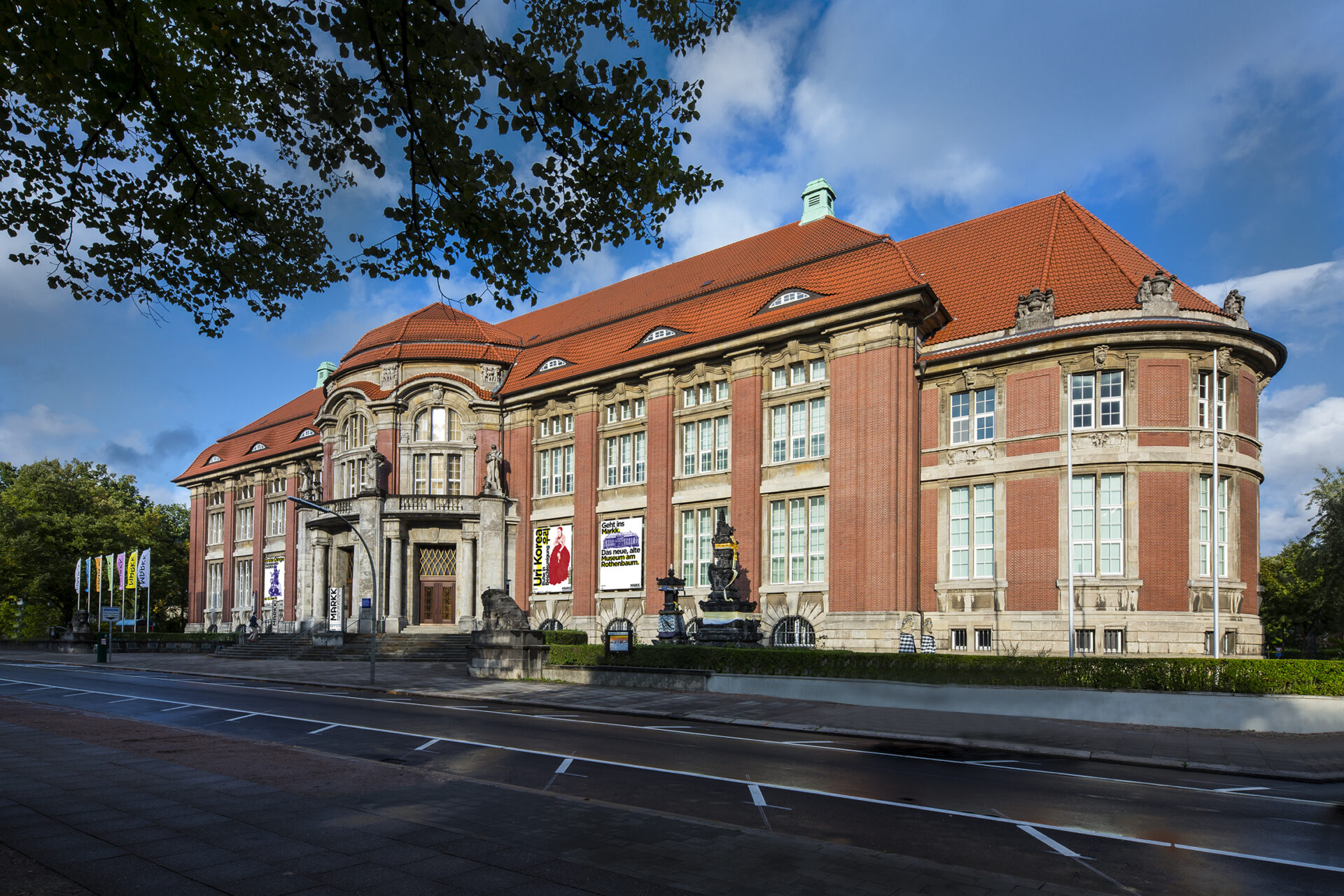
Address: Dokumenten-Archiv [Archive], Museum am Rothenbaum – Kulturen und Künste der Welt [World Cultures and Arts], Rothenbaumchaussee 64, 20148 Hamburg, Germany
Contact: Susanne Walther; responsible for the archive and estates; e-mail: susanne.walther@markk-hamburg.de
E-mail:dokumentenarchiv@markk-hamburg.de
Society of the Divine Word
House archive of the Society of the Divine Word: St. Gabriel Mission House
In the course of this project, documents relating to missionary Father Franz Vormann were also sought, as he acted as a mediator and translator for Rudolf Pöch in the German colony. In addition to a naturalisation certificate from the Foreign Office of the German Imperial Colonial Office, there is also a standardised information sheet with biographical and personal information in the house archives of the Province of the Order in St. Gabriel. No further relevant documents on Vormann were found.
Sources
- E-mail correspondence with Franz Helm on January 22, 2024
- E-mail correspondence with Harald Grauer on January 08, 2024
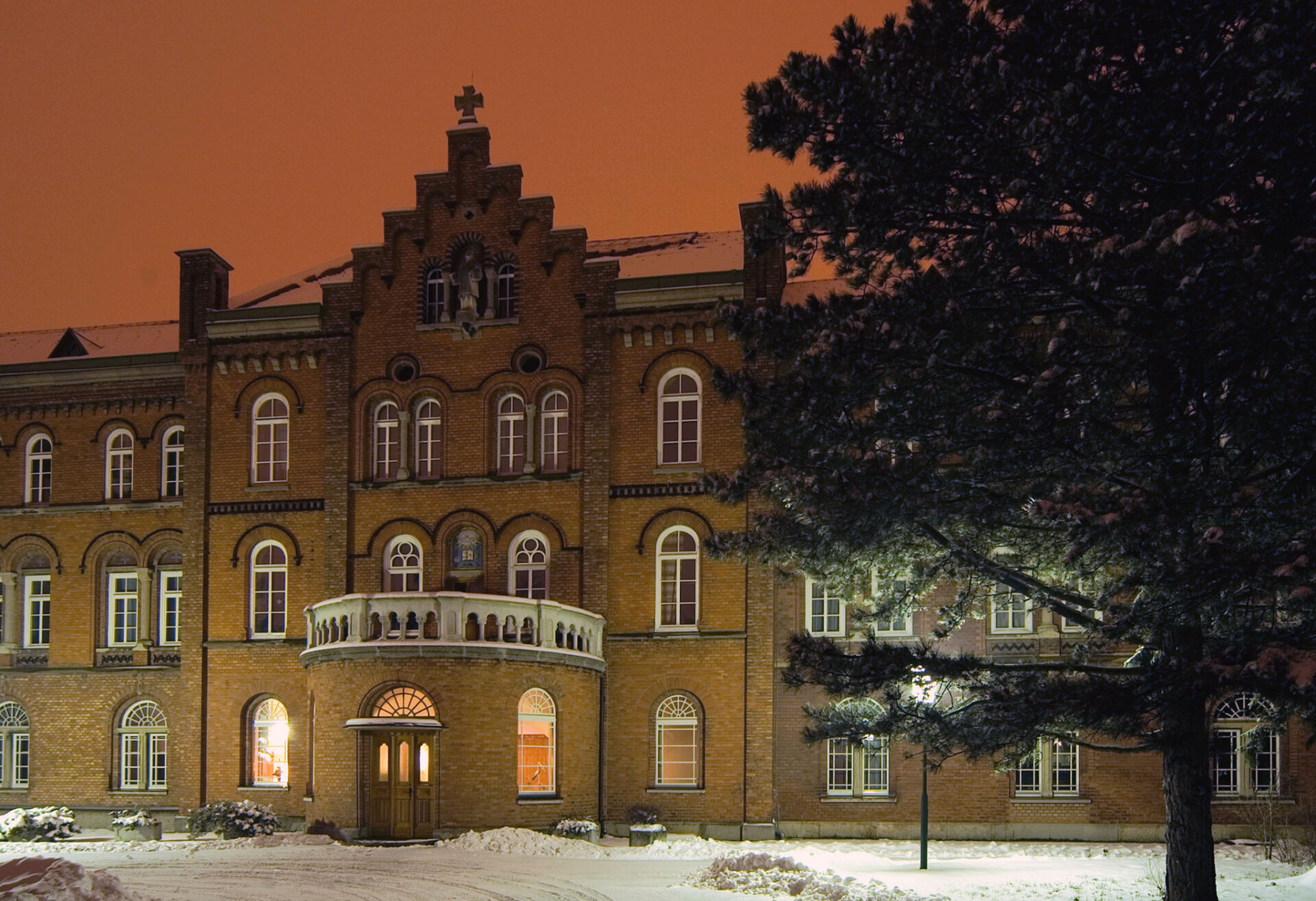
Address: Missionshaus St. Gabriel [St. Gabriel Mission House], Hausarchiv der Gesellschaft des Göttlichen Wortes [House archive of Society of the Divine Word], Gabrieler Straße 171, 2340 Maria Enzersdorf, Austria
Archive of the Anthropos Institute of the Society of the Divine Word: St. Augustin/Bonn
There are no sources relevant to the project in the Archive of the Anthropos Institute.
Sources
- E-mail correspondence with Franz Helm on January 22, 2024
- E-mail correspondence with Harald Grauer on January 08, 2024
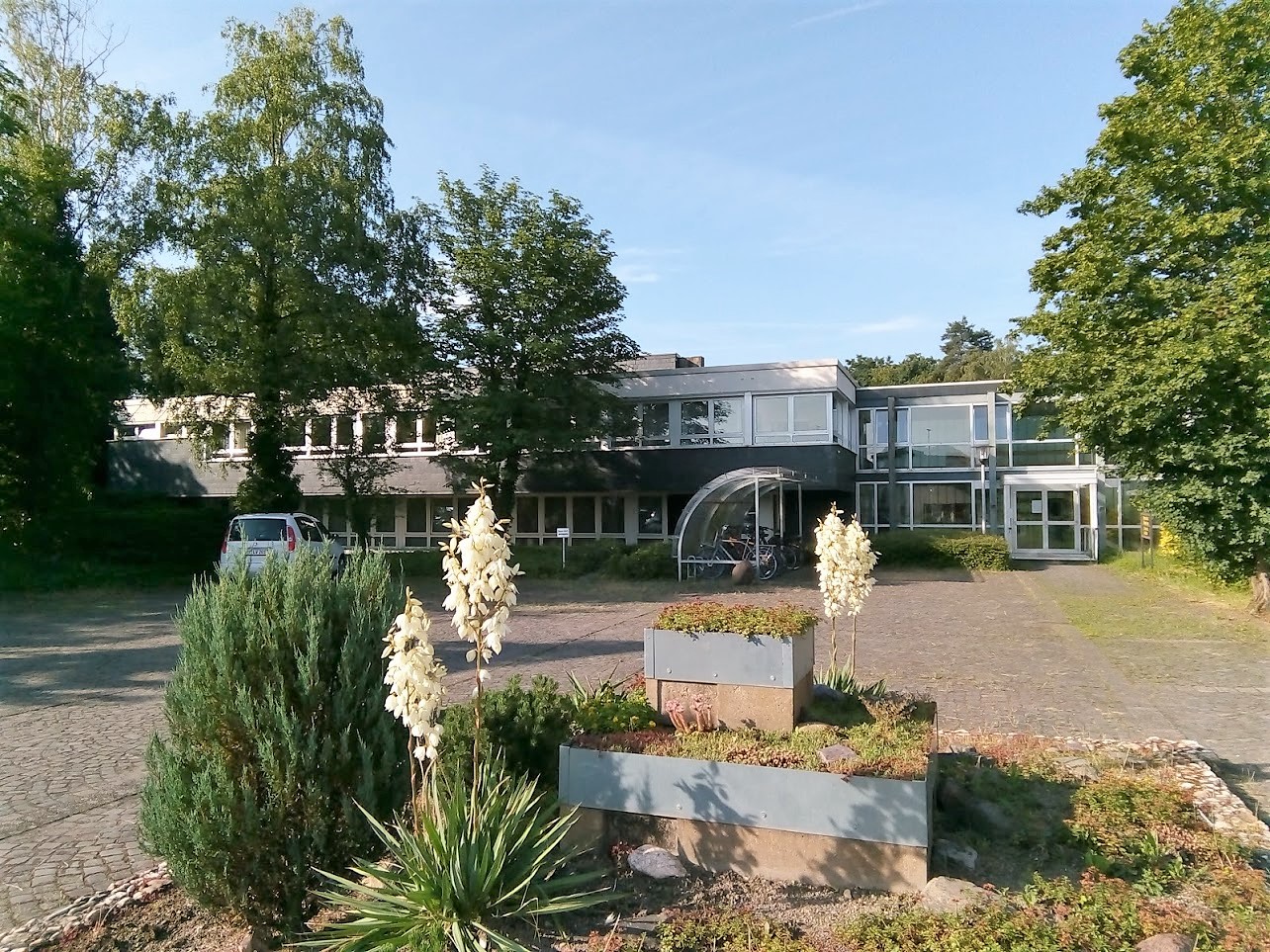
Address: Archiv des Anthropos-Instituts der Gesellschaft des Göttlichen Wortes [Archive of the Anthropos Institute of the Society of the Divine Word]: St. Augustin/Bonn, Arnold-Janssen-Straße 20, 53757 Sankt Augustin, Germany
General Archives of the Society of the Divine Word, Rome (Italy)
According to the information provided, there are no sources relevant to the project in Rome either.
Sources
- E-mail correspondence with Franz Helm on January 22, 2024
- E-mail correspondence with Harald Grauer on January 08, 2024
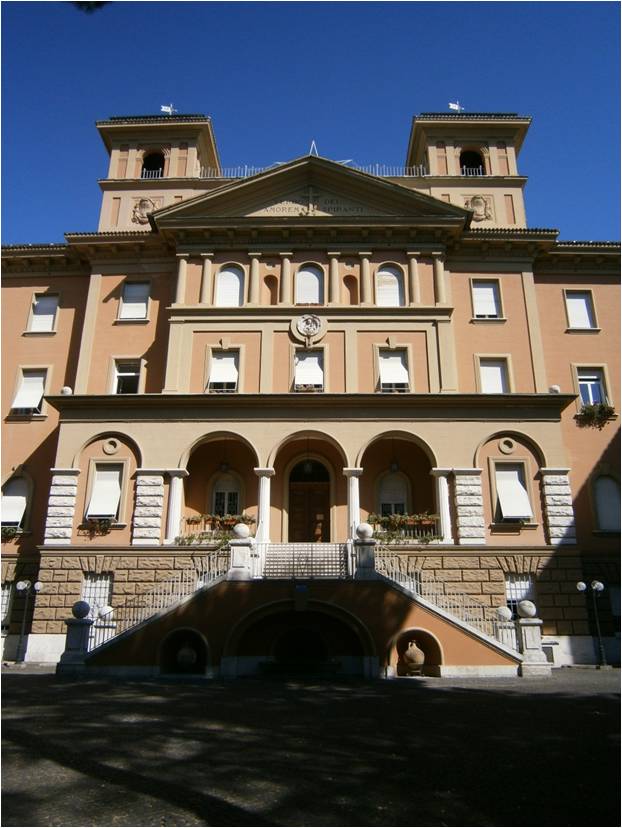
No information given to date.
Archives of the Archdiocese of Mount Hagen of the Society of the Divine Word, Mt. Hagen (Papua New Guinea)
This location is of particular importance, as the networks of the Steyler missionaries were helpful (infra-)structures for Rudolf Pöch. All documents from the time Rudolf Pöch travelled to Papua New Guinea were kept in the Alexishafen archive, which was located in the cathedral building (according to Father Jozef Maciolek, this was on the upper floor behind the organs). The cathedral was completely destroyed by the American air force on September 1, 1943. Only the documents that had previously been sent to Europe have survived.
Source
- E-mail correspondence with Jozef Maciolek on February 07, 2024

No information given to date.
Ethnological Museum of the Berlin State Museums
Abteilung Medien: Musikethnologie, Berliner Phonogramm-Archiv und Visuelle Anthropologie
The Berlin Phonogramm-Archiv holds wax cylinders with original recordings that Pöch recorded with an Edison phonograph. They were intended as “Vorstudien” [preliminary studies] for recordings with the Viennese archive phonograph. There are also copies of recordings from the Phonogrammarchiv of the Austrian Academy of Sciences in Vienna. These are a selection of the plates recorded by Pöch between 1904 and 1906.
Further information on the recordings of the Berlin Phonogramm-Archiv can be found in the following publication: Ziegler, Susanne (2006): Die Wachszylinder des Berliner Phonogramm-Archivs. Ethnologisches Museum – Staatliche Museen zu Berlin [The wax cylinders of the Berlin Phonogramm-Archiv. Ethnological Museum – Berlin State Museums].
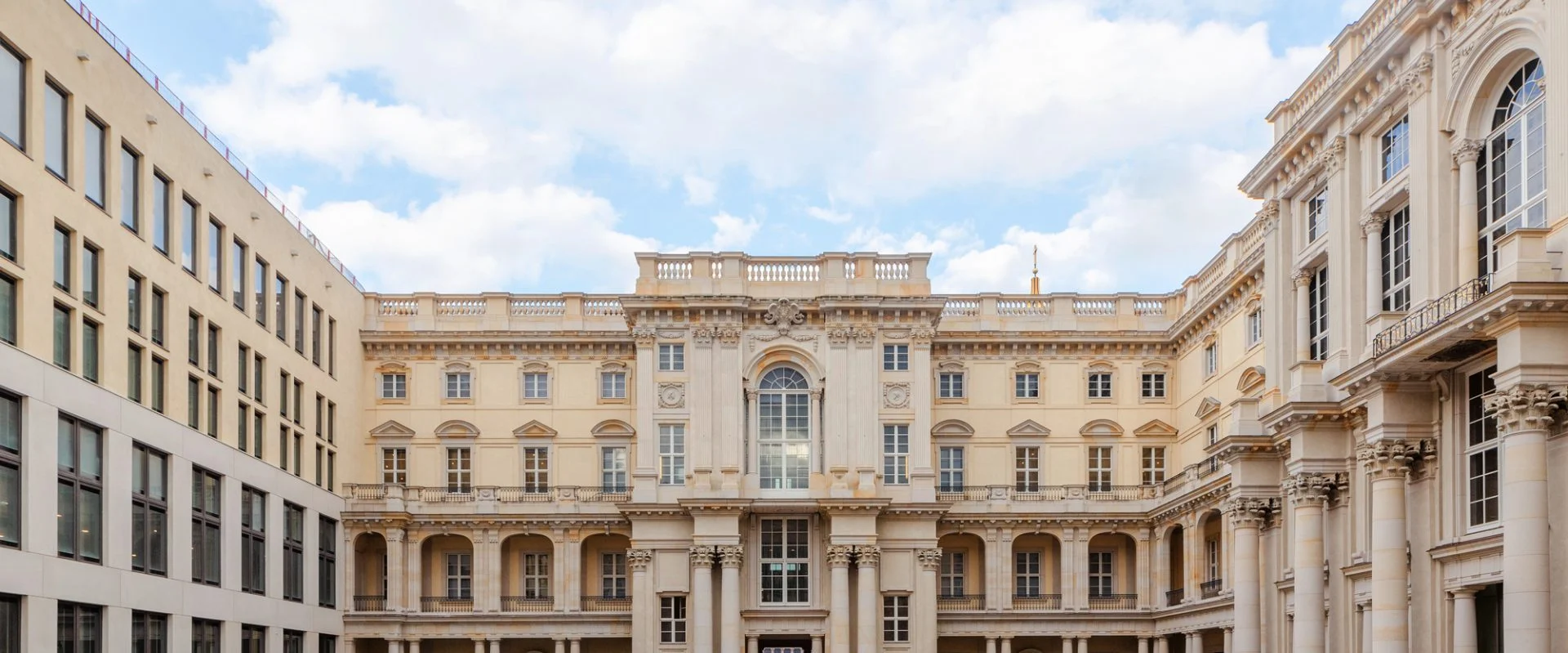
Address: Abteilung Medien [Department of Media], Ethnologisches Museum der Staatlichen Museen zu Berlin [Ethnological Museum of the Berlin State Museums], Arnimallee 23-27, 14195 Berlin, Germany
Link to Website (GER)
orLink to Website (EN)
Contact: Albrecht Wiedmann
E-Mail: phonogramm-archiv@smb.spk-berlin.de
Basel-Stadt State Archives
Correspondence between Karl Friedrich “Fritz” Sarasin and Rudolf Pöch can be found in the Basel-Stadt State Archives [Staatsarchiv Basel-Stadt]. A letter dated 07.09.1906 makes it clear that Fritz Sarasin gave Pöch advice on equipment for a trip to Papua New Guinea, such as wearing linen stockings and taking certain tent cloths with him. Pöch also reports on his use of quinine prophylactics, which were mainly used at the time to combat malaria (cf. Bd. XXVI, Signatur PA 212a T 2 XXVI, Brief 113).
Furthermore, there is an exchange (1919) between Pöch and Fritz Sarasin (cf. Bd. XXX), in which a meeting with Otto Schlaginhaufen is discussed in order to exchange views on “die anthropologische Methodologie” (cf. Bd. XXX, Signatur: PA 212a T 2 XXX, Brief 213 [The anthropological methodology]). Otto Schlaginhaufen (1879–1973) was a Swiss anthropologist and “racial hygienist” who himself travelled to what was then known as Neumecklenburg as part of a colonial naval expedition from 1907 to 1910. Schlaginhaufen also wrote an obituary for Rudolf Pöch.
In the publication by Bernard C. Schär (2015) Tropenliebe Schweizer Naturforscher und niederländischer Imperialismus in Südostasien um 1900 [Swiss naturalists’ love of the tropics and Dutch imperialism in Southeast Asia around 1900], the author writes about the history of the patrician sons and ethnologists Karl Friedrich “Fritz” Sarasin and Paul Benedikt Sarasin-Hohenester, who themselves brought thousands of plants, animals and ethnographic objects from colonial contexts to Basel.
Source
- Digitaler Lesesaal Staatsarchiv Basel-Stadt. n.d. “Rudolf Pöch (1870-1921), Silvaplana“. Accessed April 15, 2024. https://dls.staatsarchiv.bs.ch/records/426789, 2024.
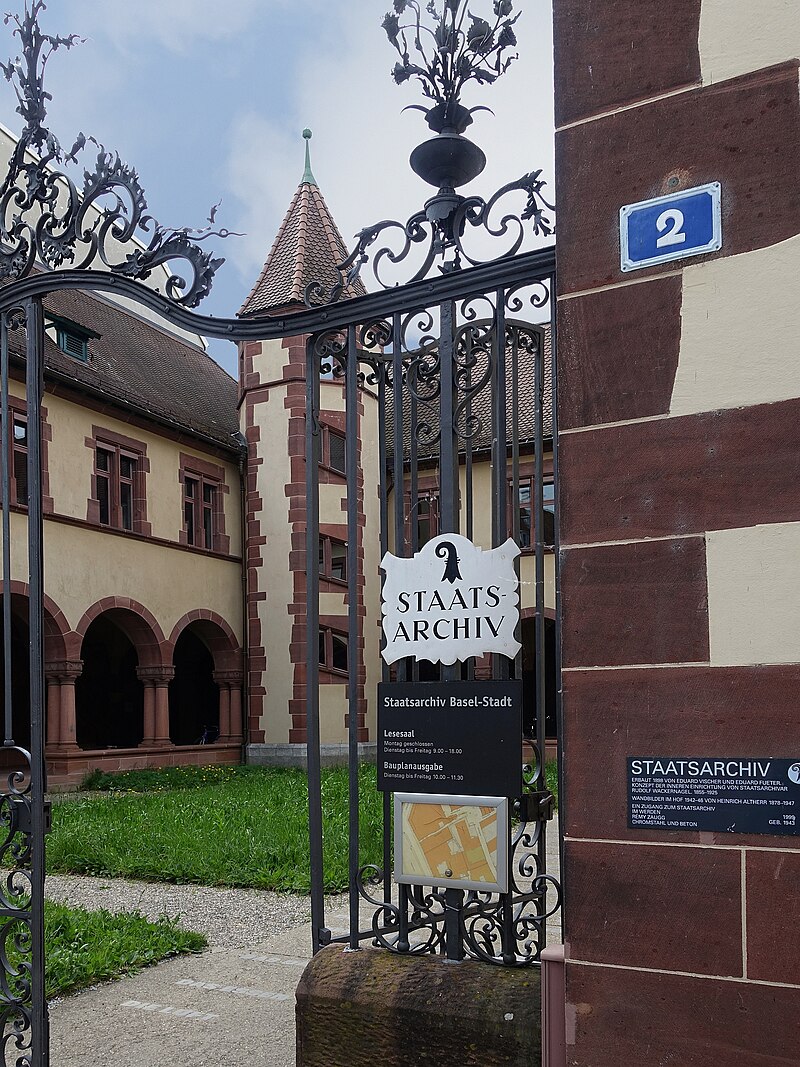
Address: Staatsarchiv Basel-Stadt [Basel-Stadt State Archives], Martinsgasse 2, 4051 Basel, Switzerland
Research information: The database Digitaler Lesesaal [Digital Reading Room] (GER) of the Basel-Stadt State Archives allows you to search for files, images and plans in the holdings of the State Archives.
For online research:
– https://dls.staatsarchiv.bs.ch/records/426789 (GER)
– https://davel.vd.ch/detail.aspx?Id=949555
– https://swisscollections.ch/Record/991170493493805501

